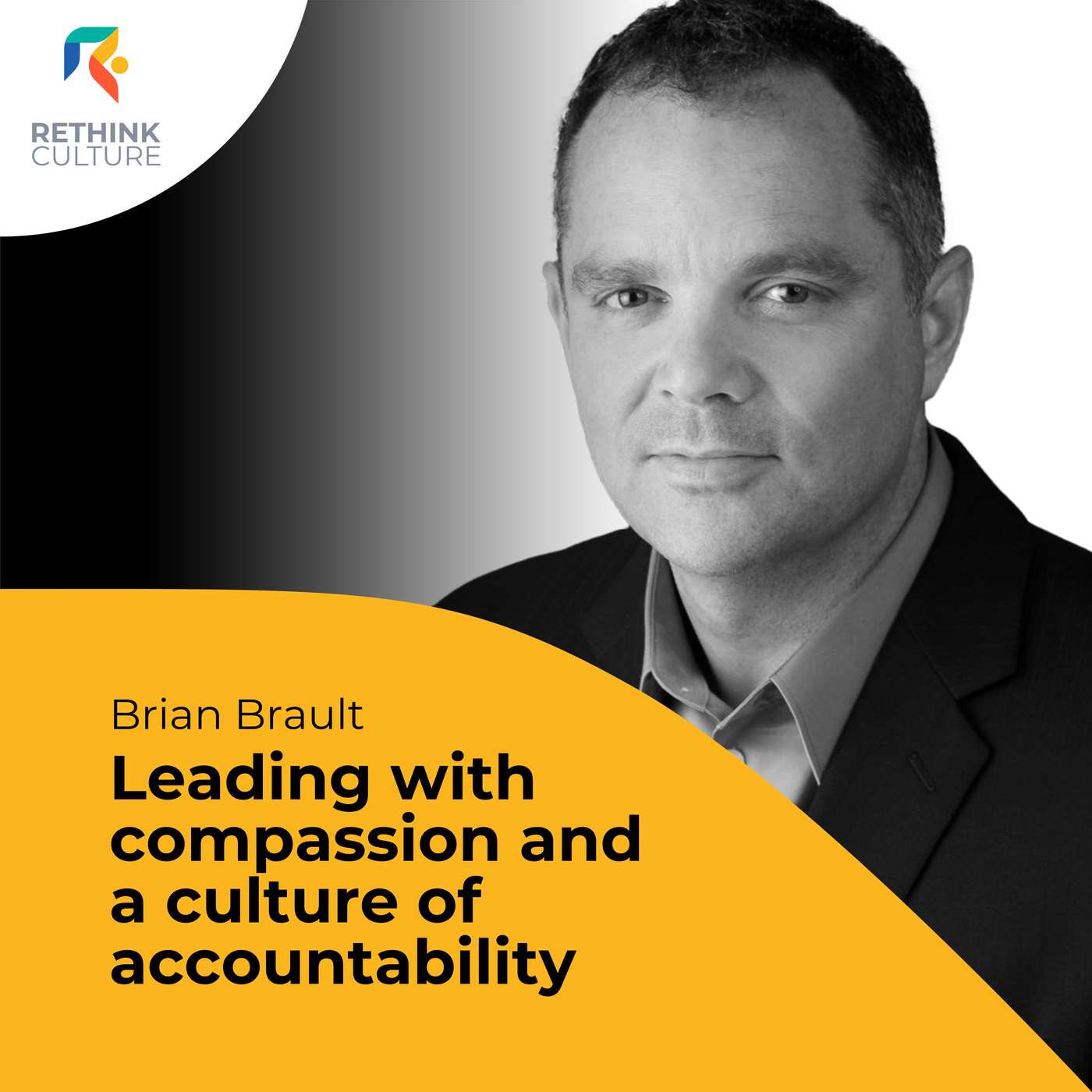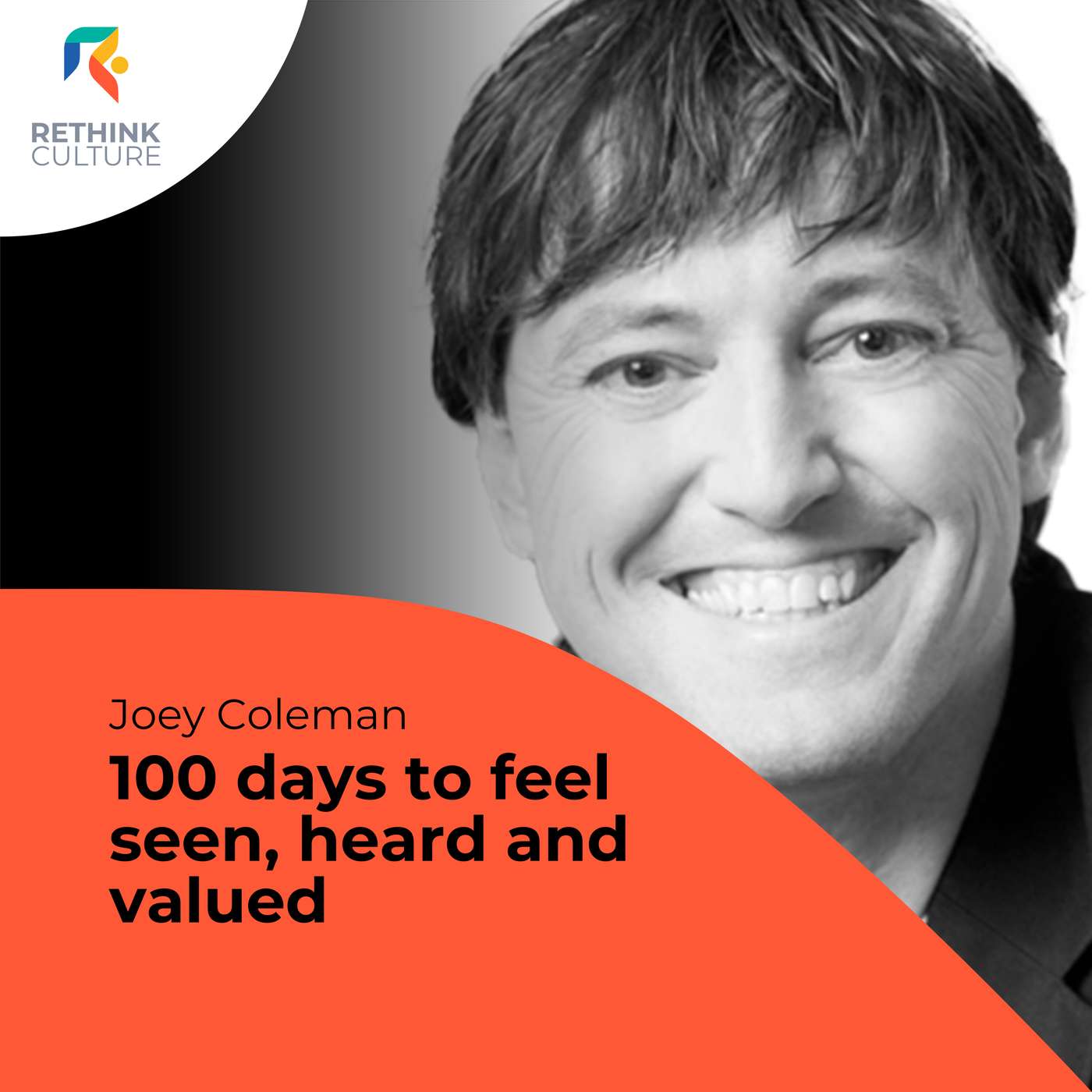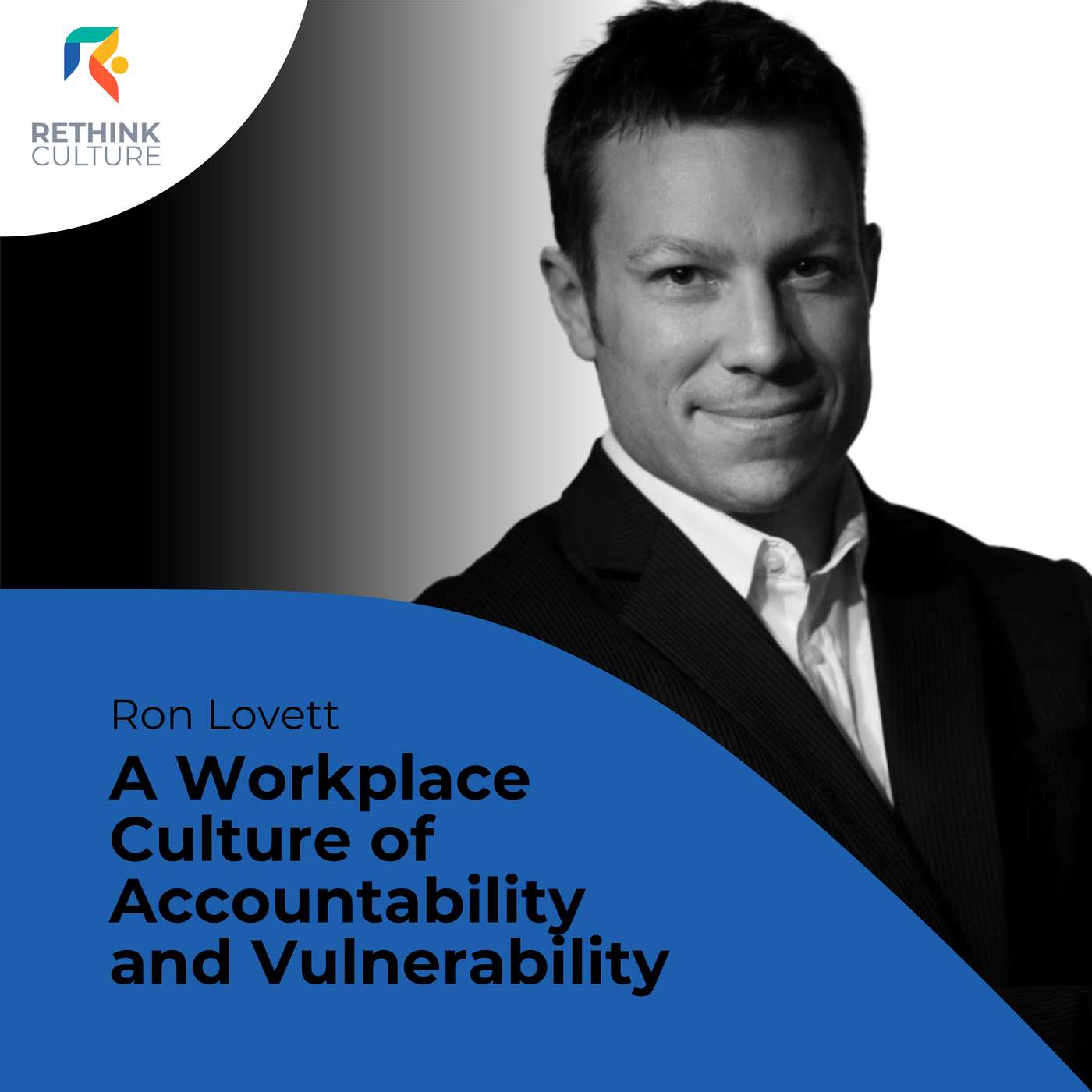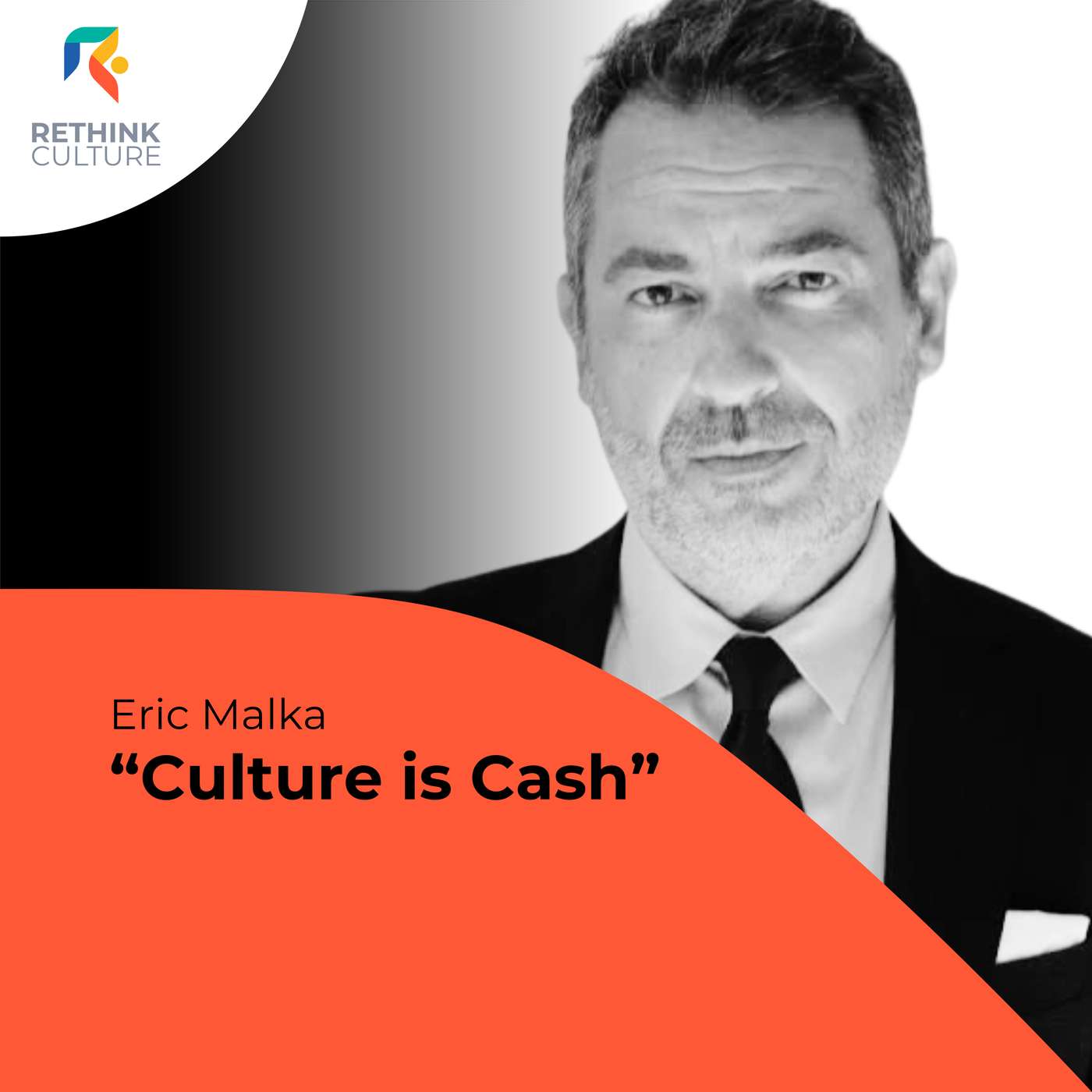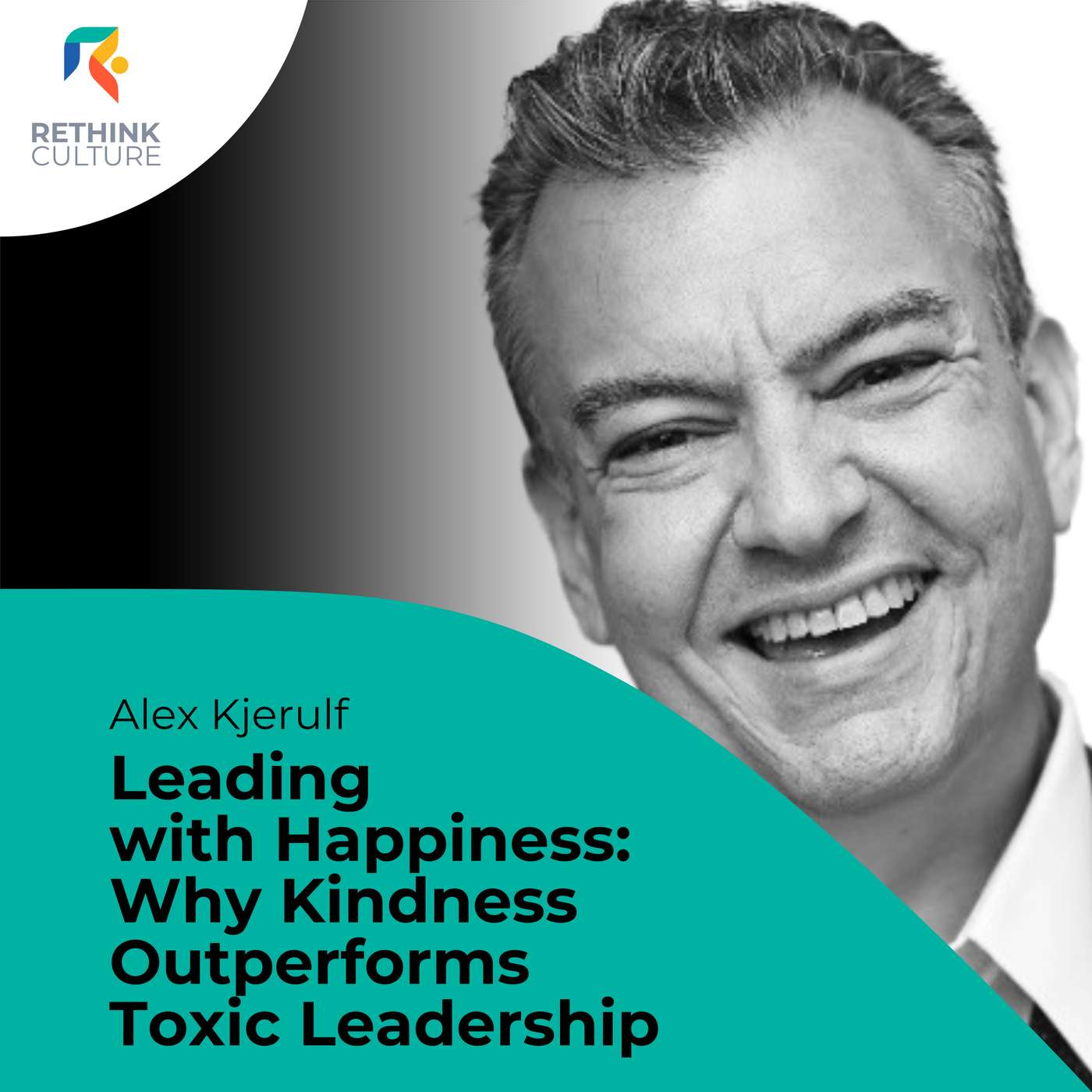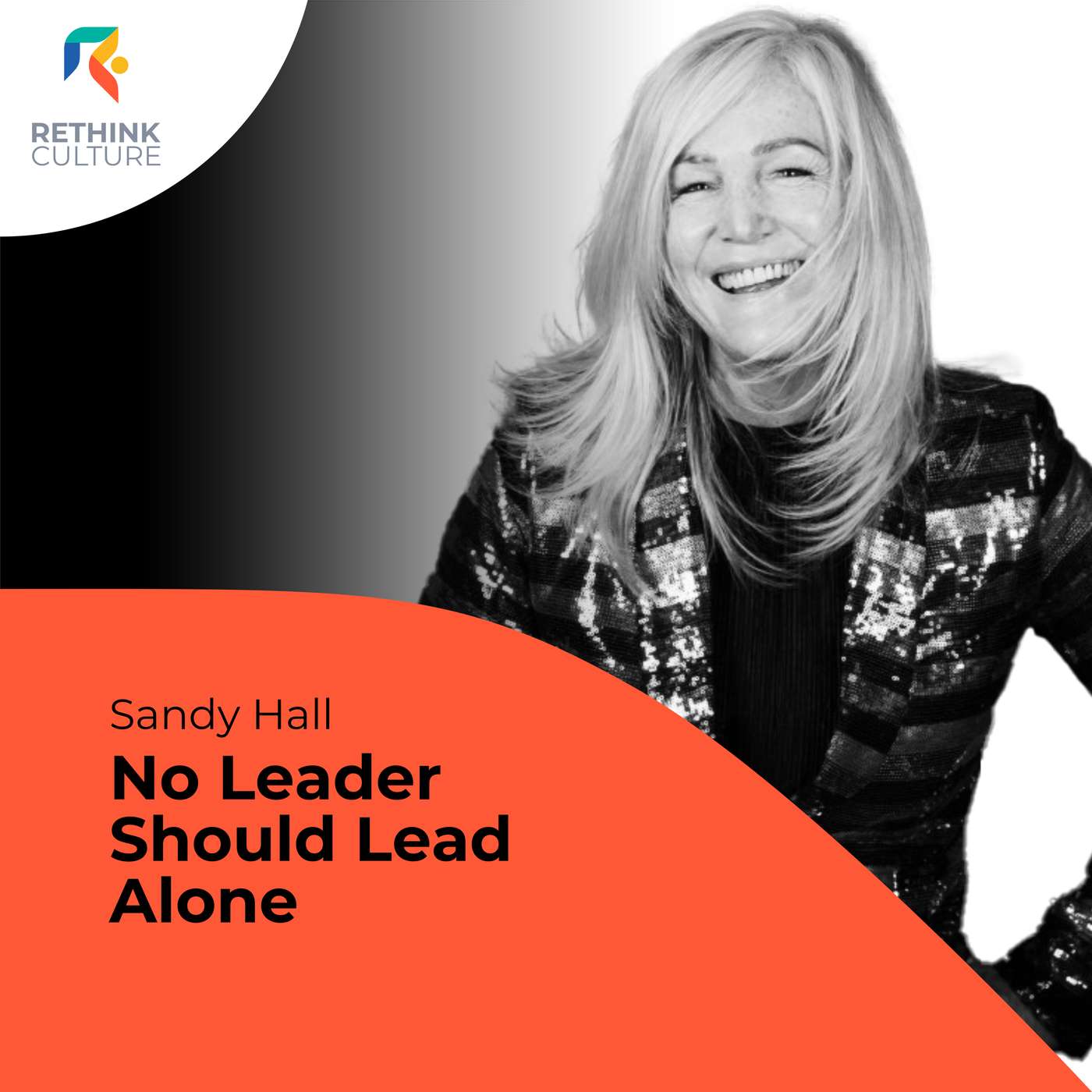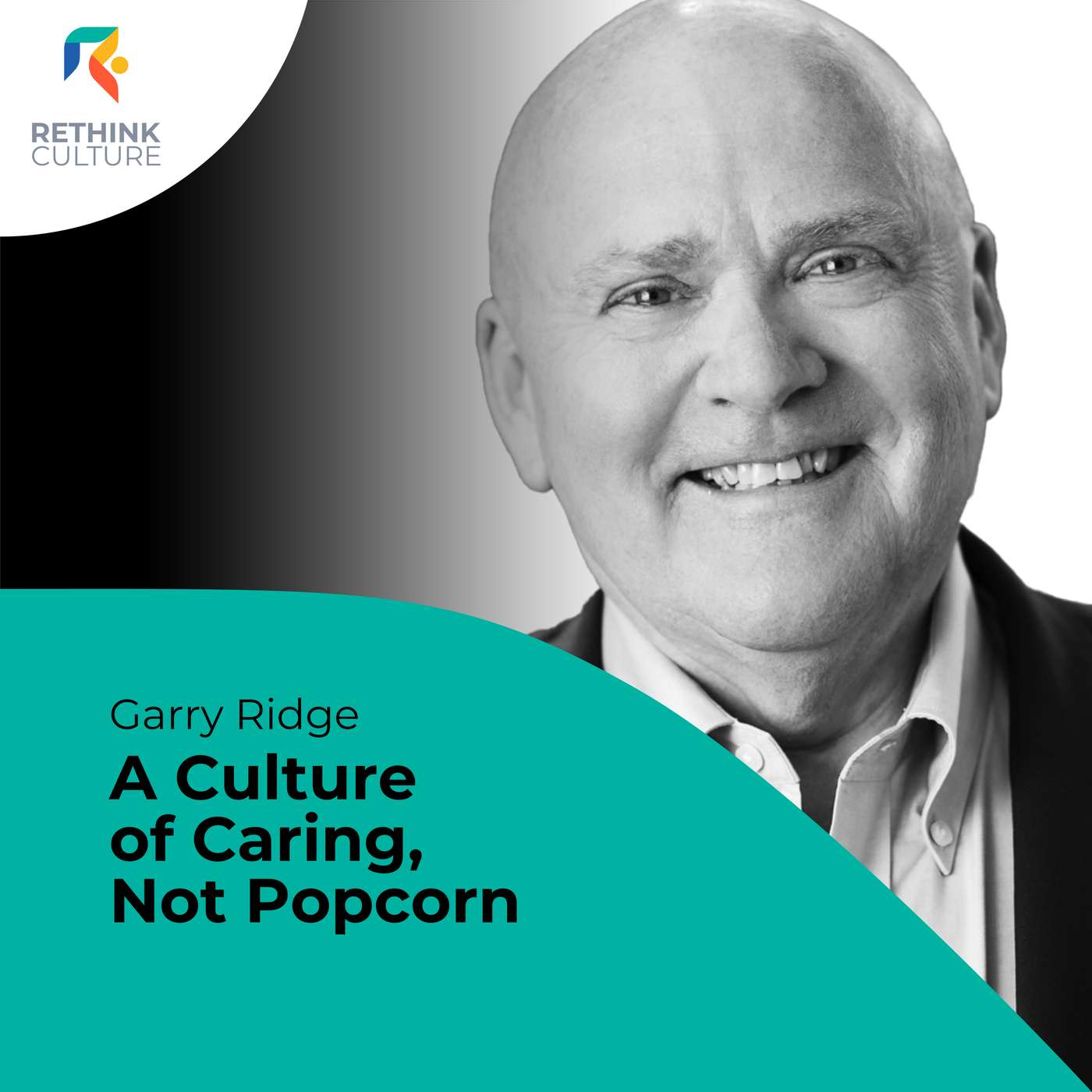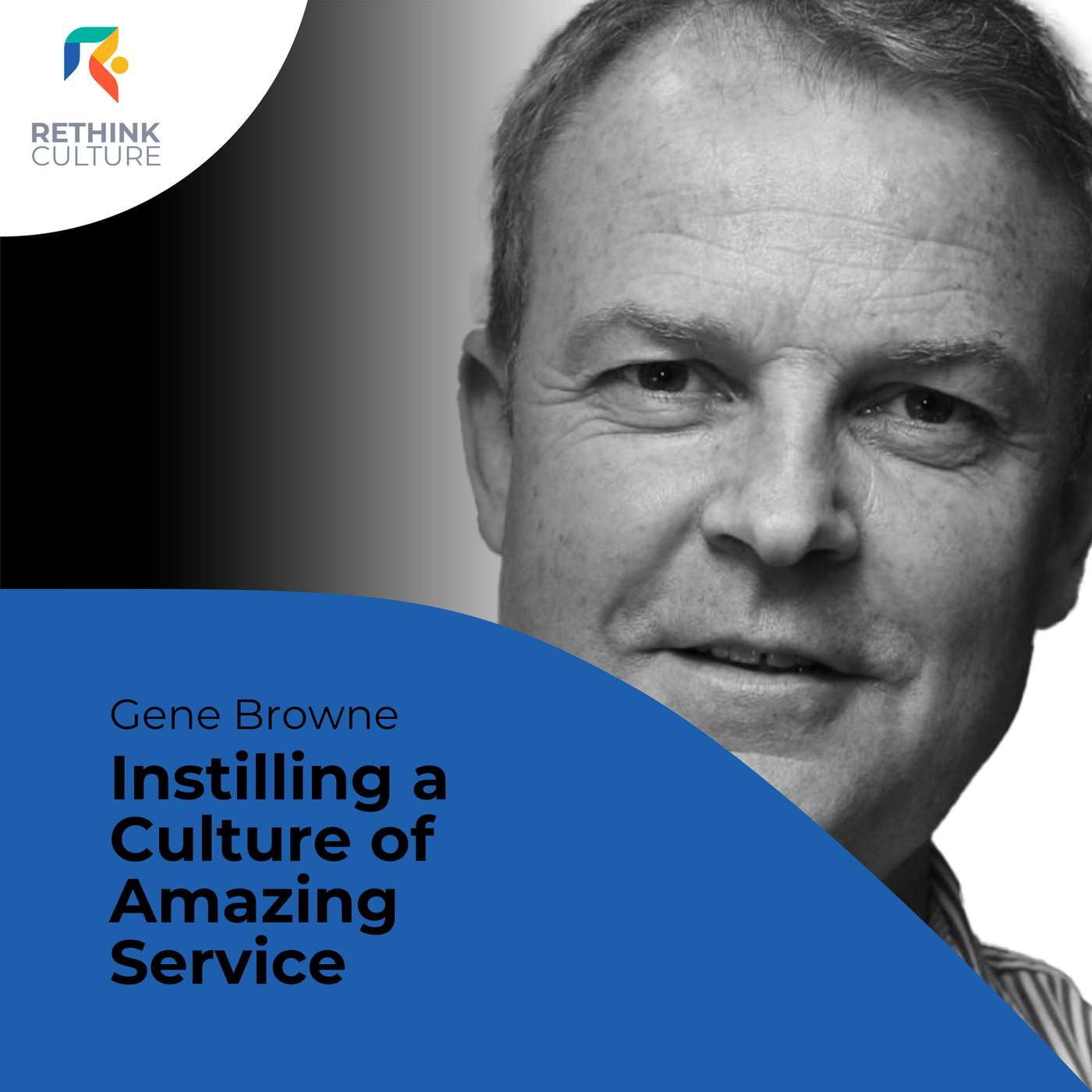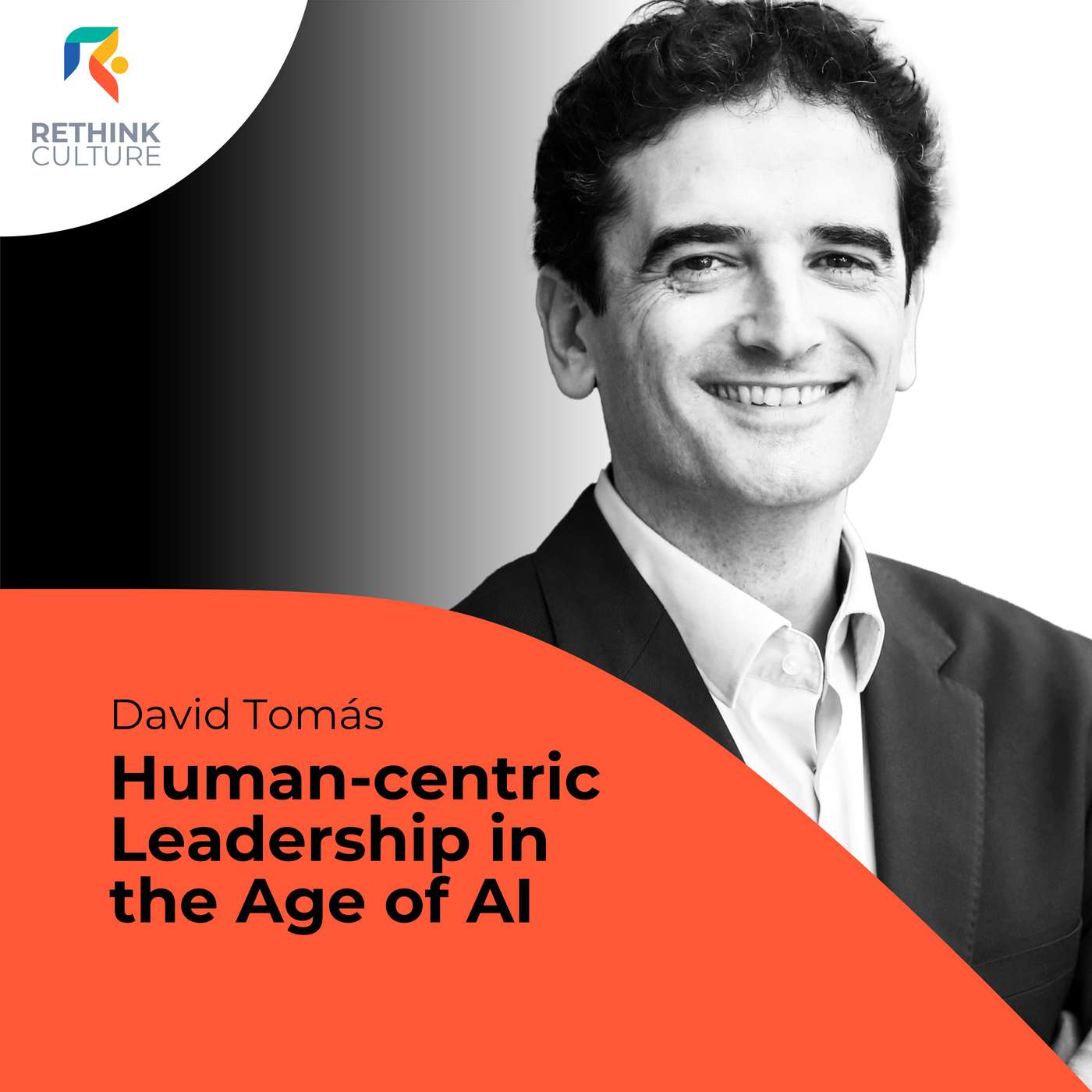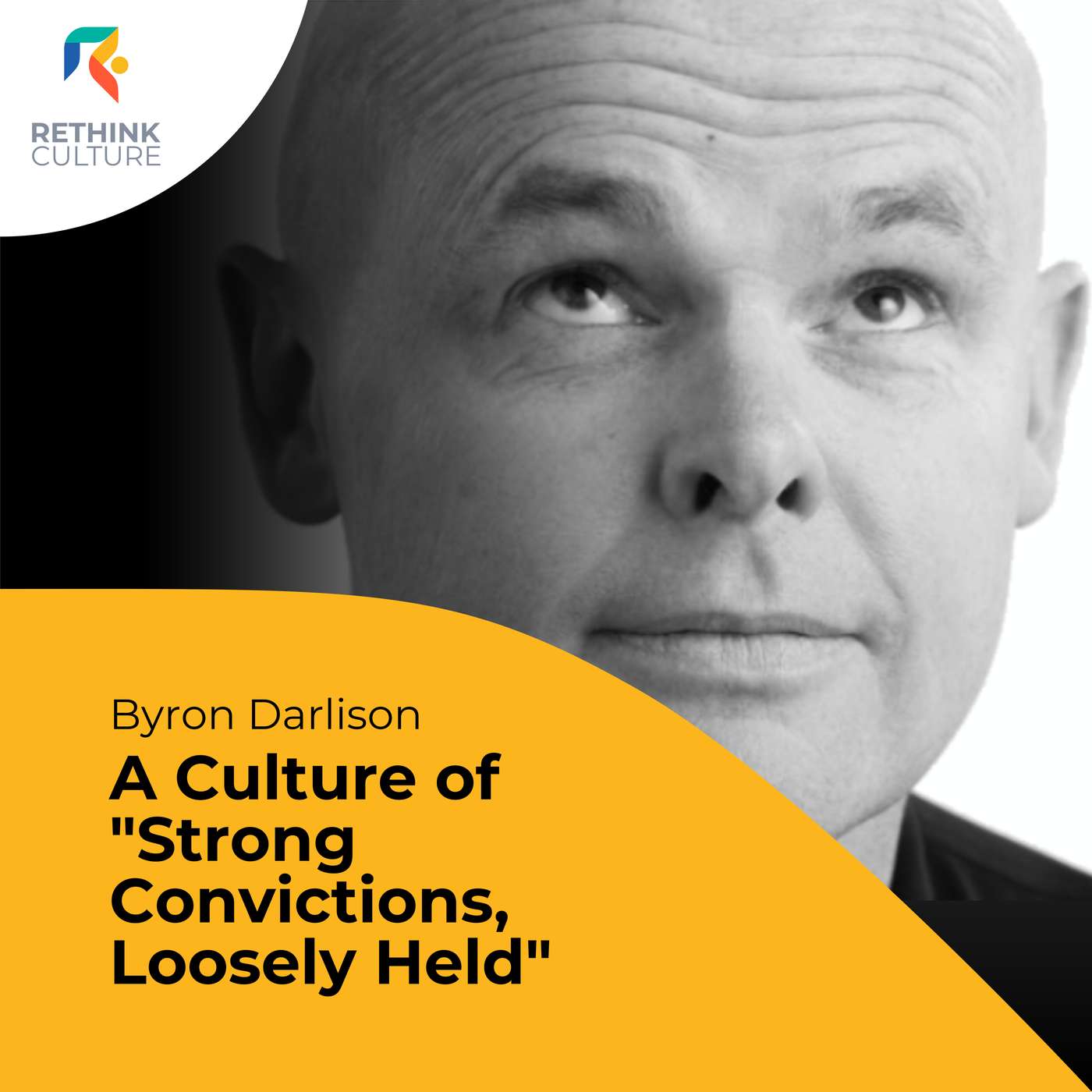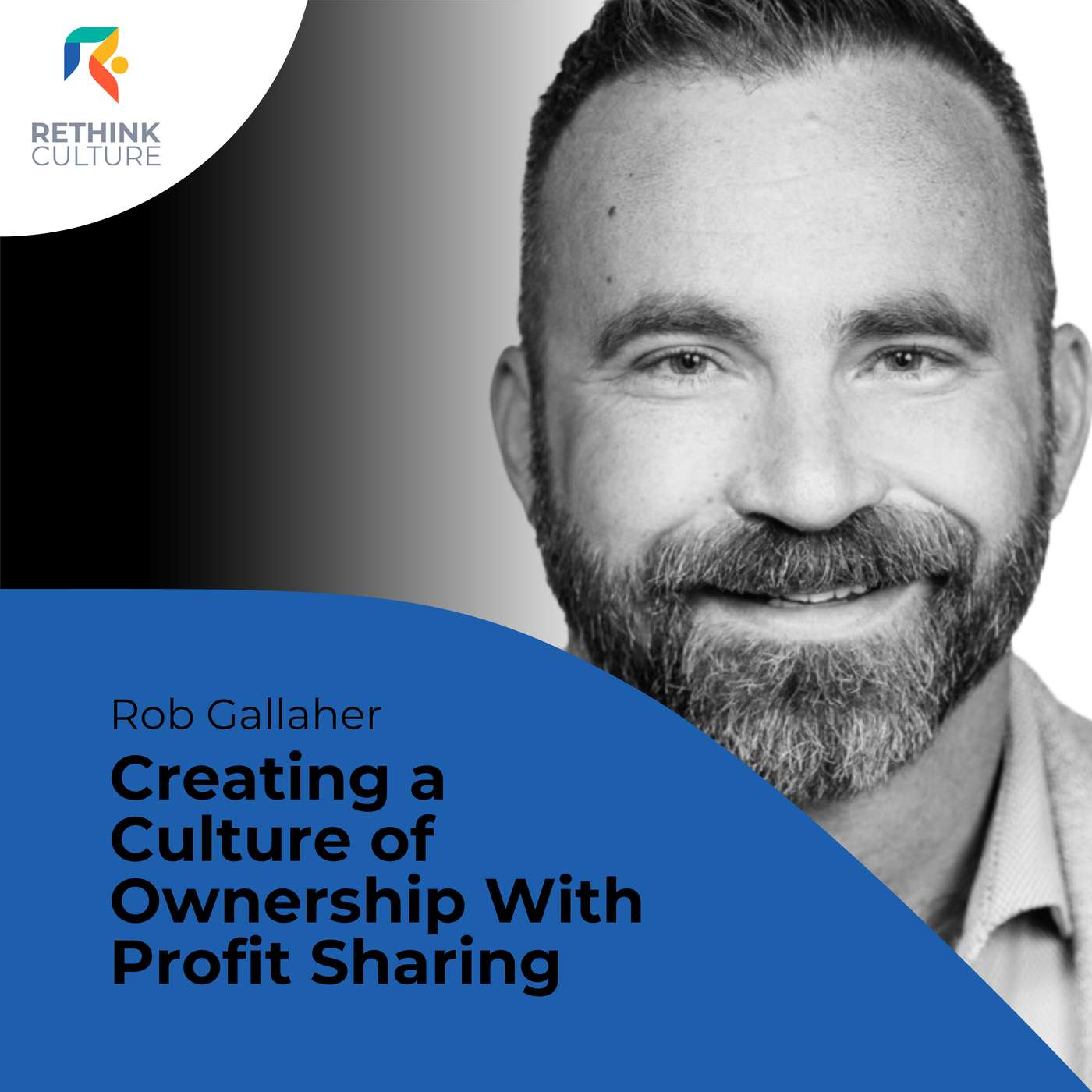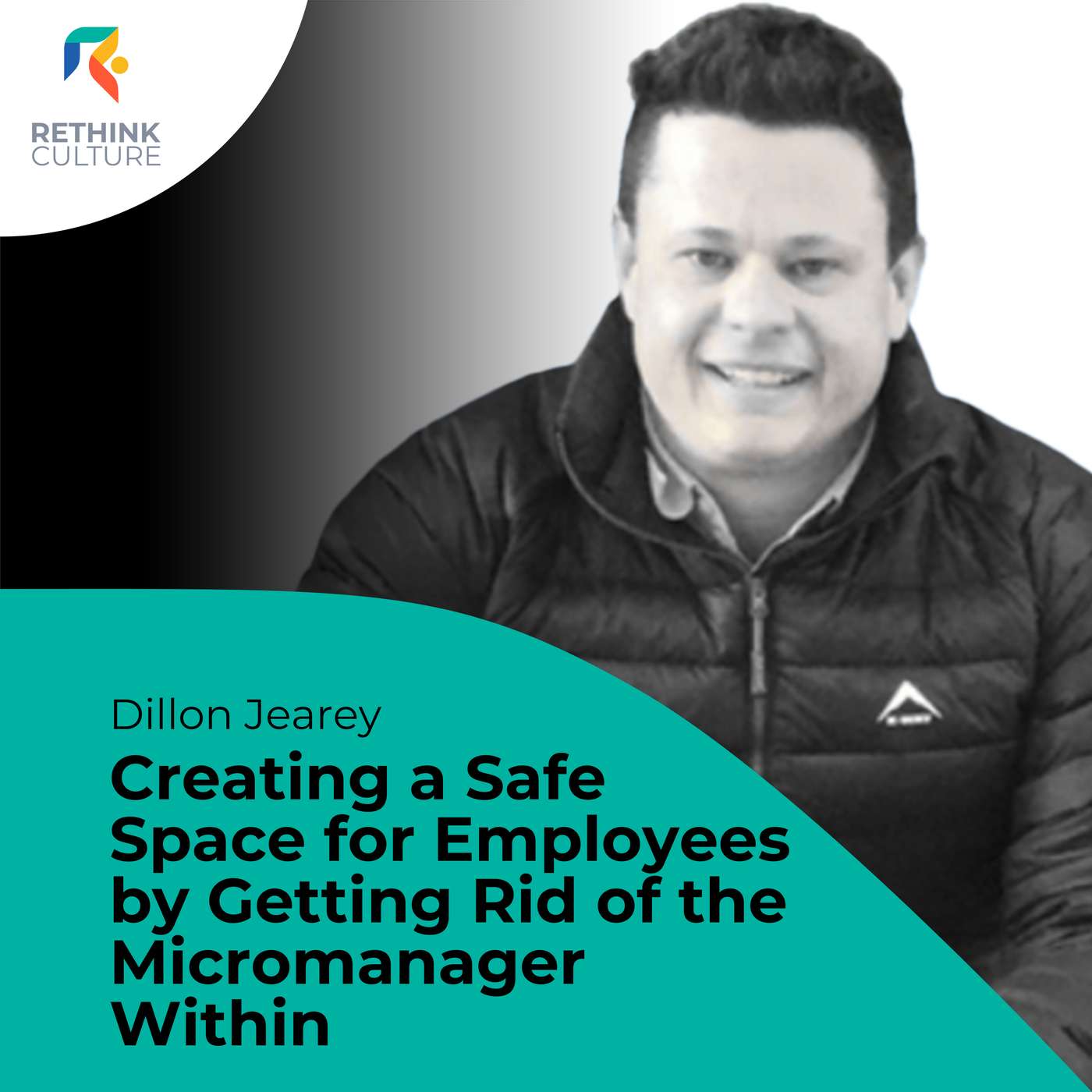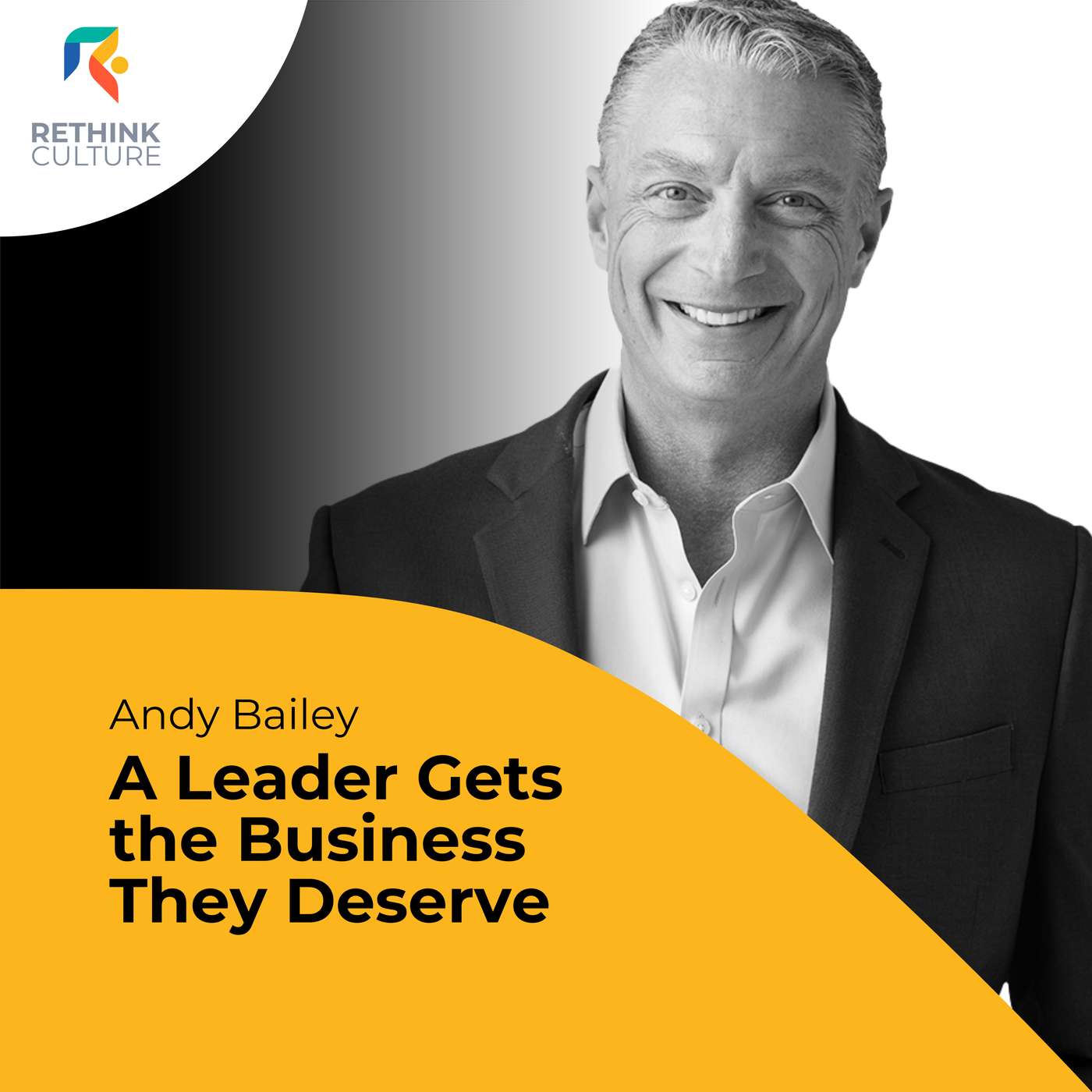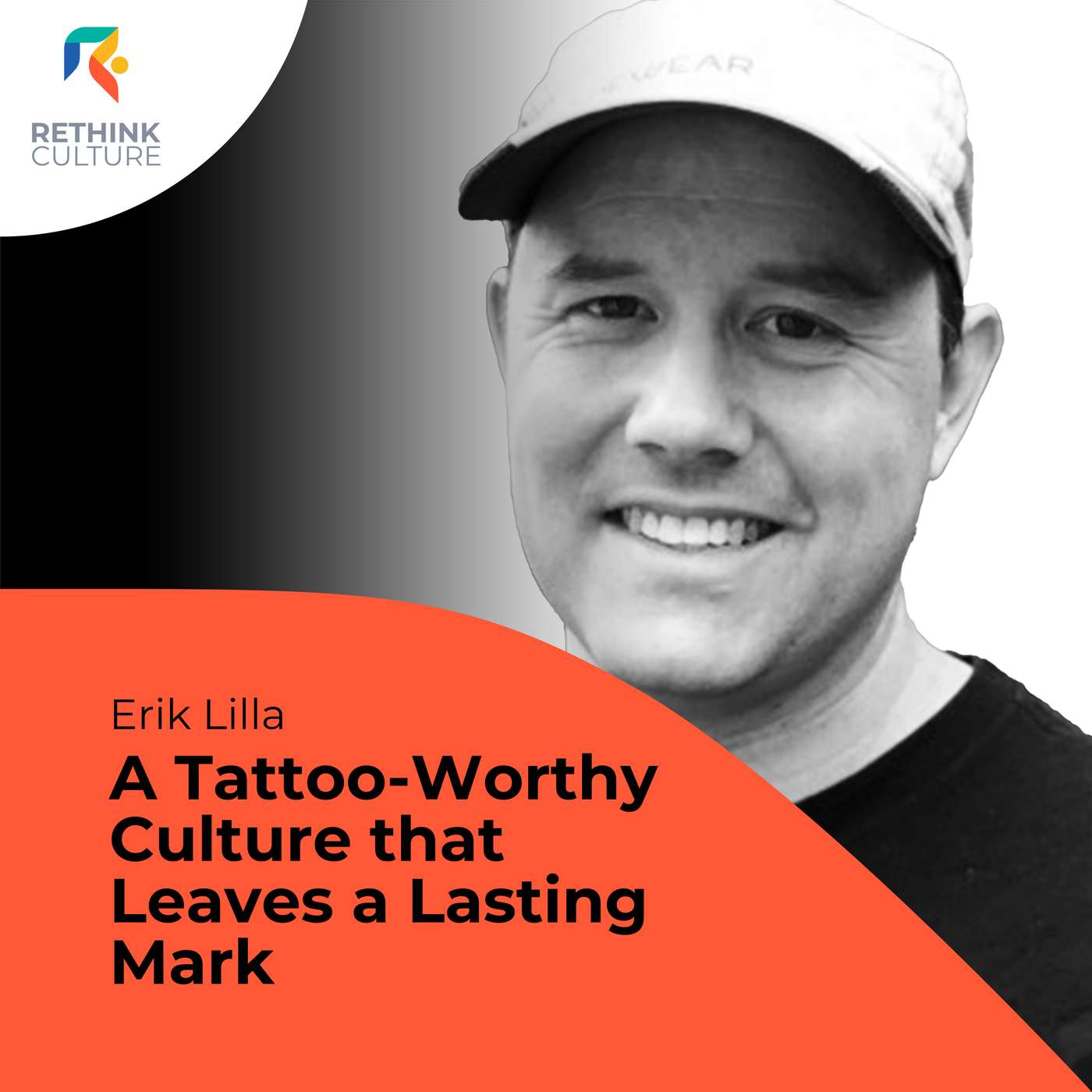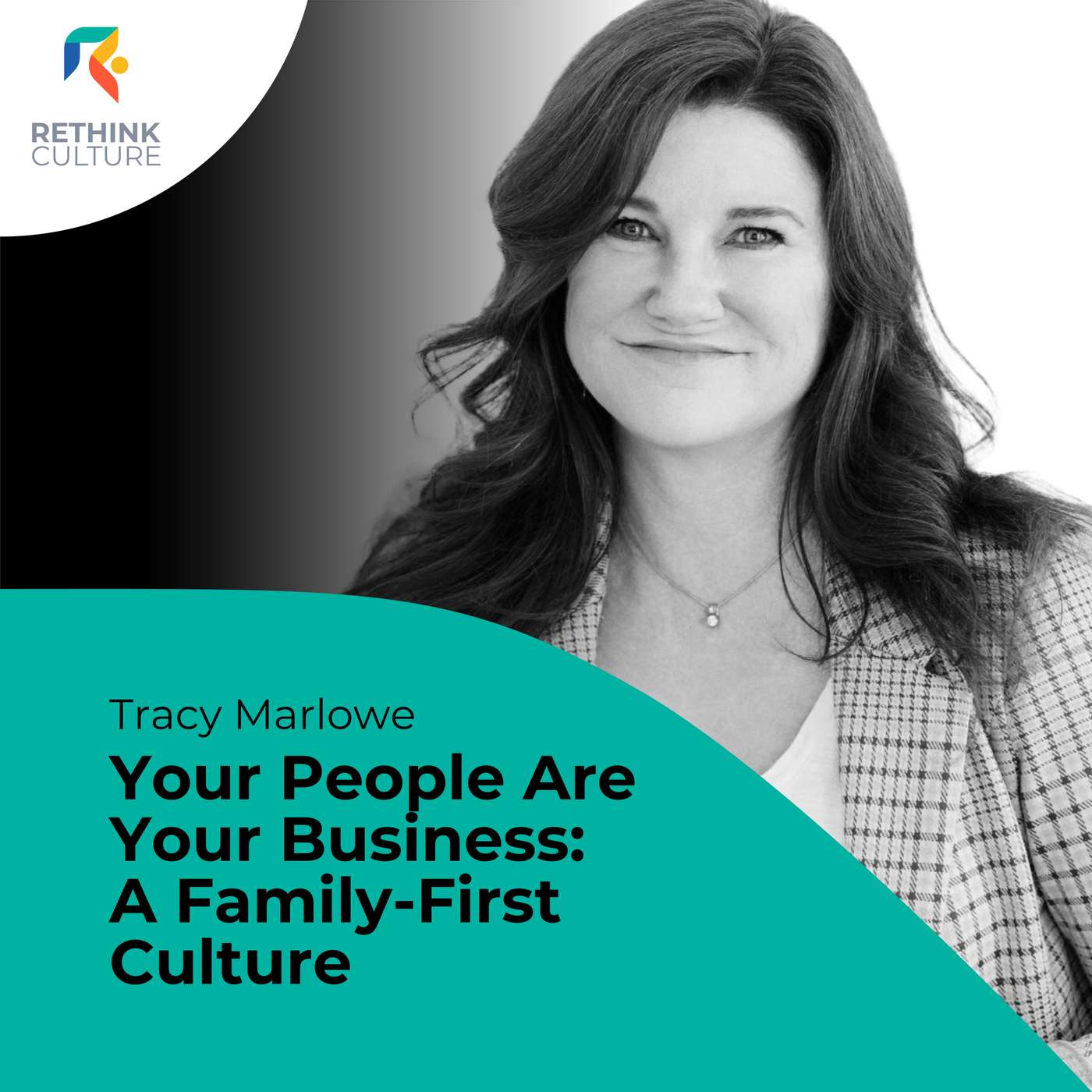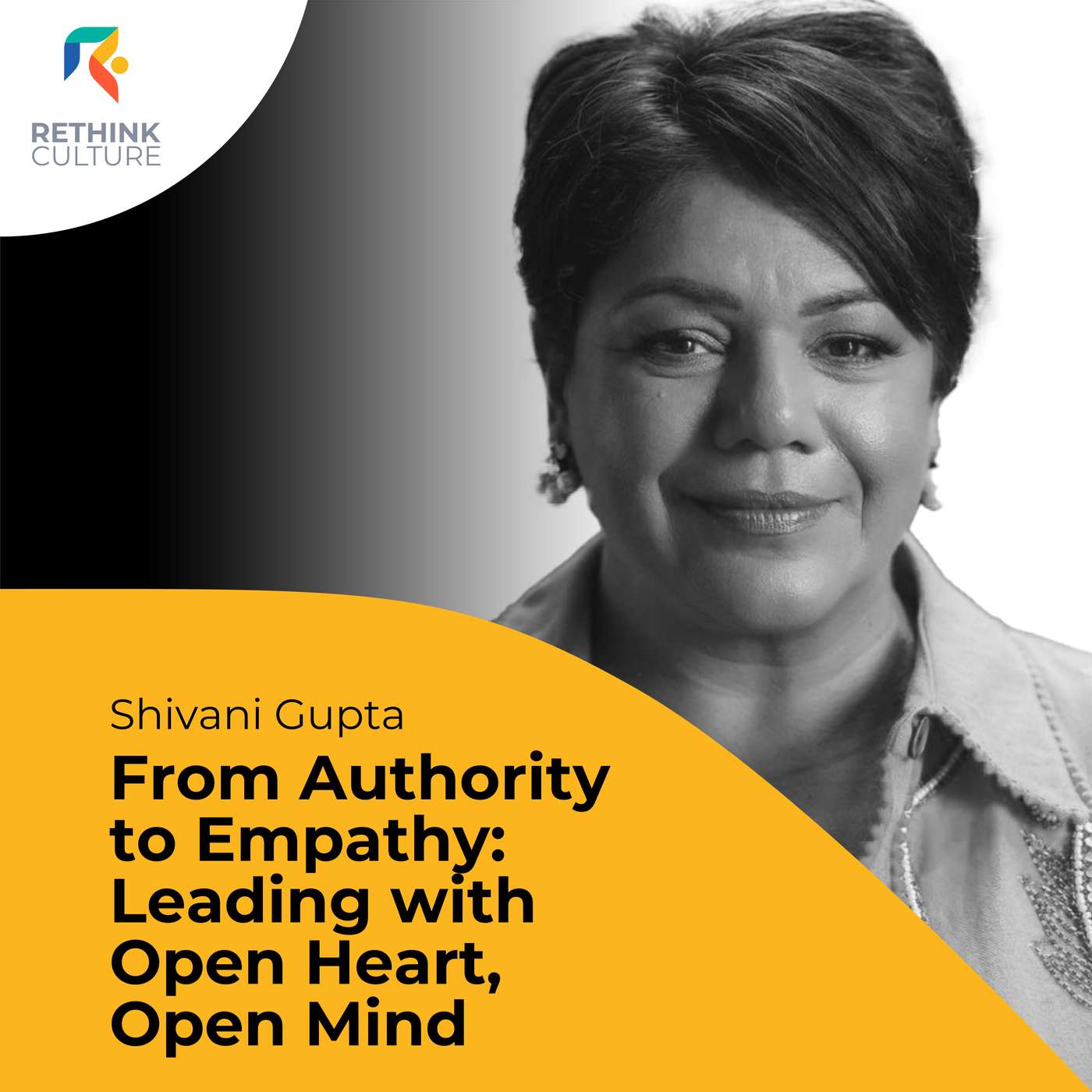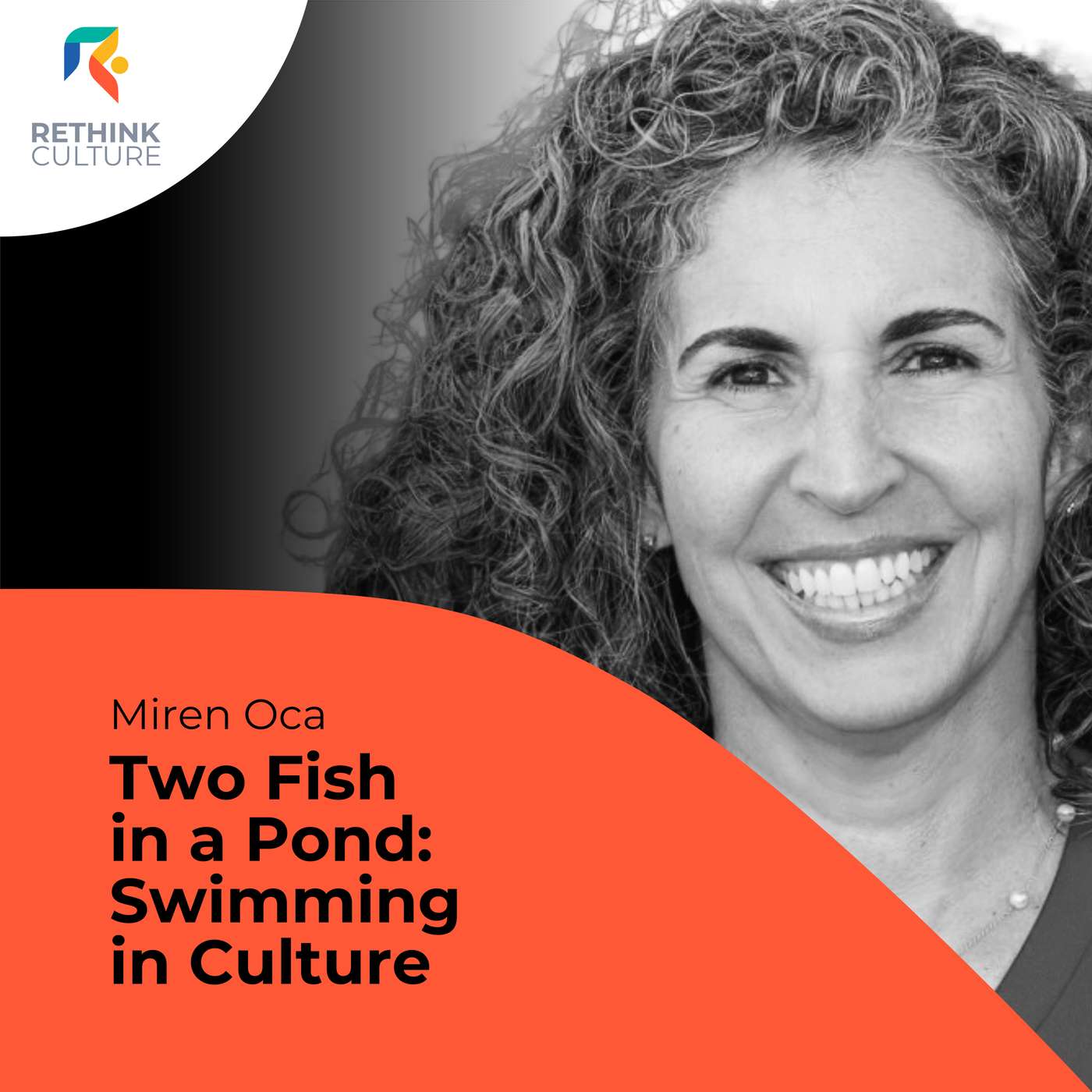Discover Rethink Culture
Rethink Culture

Rethink Culture
Author: Andreas Konstantinou
Subscribed: 3Played: 20Subscribe
Share
© 2025 Andreas Konstantinou
Description
Rethink Culture is the podcast that shines the spotlight on the leaders who are rethinking workplace culture. Virtually all of the business leaders who make headlines today do so because of their company performance. Yet, the people and the culture of a company is at least as important as its performance. It's time that we shine the spotlight on the leaders who are rethinking workplace culture and are putting people and culture at the forefront.
69 Episodes
Reverse
“You lead human beings and human beings have lives and sometimes those lives are going really well and other times are dealing with challenges. Recognize the humanity in the people that you lead… If we lean in with curiosity and lean in with compassion first and we make people feel like they are genuinely cared about and valued as part of our team, you will see people accomplish things that you just wouldn't imagine.” ~Brian Brault We’re republishing one of our Culture Classics featuring Brian Brault, founder of Legacy of Significance and former Global Chair of the Entrepreneurs’ Organization. Brian has built award-winning companies and now dedicates his work to helping leaders create cultures rooted in compassion and accountability. Brian Brault shares how leaders can transform organizational culture by shifting from positional authority to relational leadership. He explains why emotional intelligence, vulnerability, and genuine care are non-negotiable for high-performing teams. From scaling a company from 100 to 300 employees to mentoring global entrepreneurs, Brian’s insights show how compassion and accountability drive sustainable success. 📢 Do you want to build a high-performance culture? It all starts here: https://www.rethinkculture.co Production, video, and audio editing by Evangelia Alexaki of Musicove Productions. Listen to this episode to discover:Why compassion and accountability are the foundation of high-performance cultureHow relational leadership changes team dynamicsThe three questions every leader must help their team answerWhy vulnerability builds trust and accelerates growthHow emotional intelligence sets great leaders apartPractical lessons from scaling businesses and mentoring global leadersFurther resources:Discover Your True North, by Bill GeorgeThe Power of Vulnerability, by Brené Brown, Episode Chapters:00:00 — Introduction 01:51 — About the Legacy of Significance 04:21 — Becoming conscious about leadership and culture 13:16 — Lessons from the path of leadership in EO 21:37 — Vulnerability as a leadership strength 26:46 — Accountability in action 32:09 — The power of accountability 38:44 — The catalyst that shaped Andreas as a leader 42:47 — Embracing mistakes and leading with compassion 45:27 — Red Shoe moments 48:48 — What leaders should rethink about culture
“In the first 100 days in most organizations, employees feel overwhelmed. They feel unconnected... unseen, unheard, unappreciated… Lots of times leaders will say, "Well, it will be better if we're all back in the office." Why? What proof do you have? As we look at research data... the great majority of employees are happier working remotely than want to work in the office.” ~Joey ColemanWe're republishing one of our "Culture Classics" featuring Joey Coleman, bestselling author of 'Never Lose an Employee Again'. Joey brings a bold, data-backed perspective on employee retention, remote work, and the critical importance of the first 100 days. With experience spanning the CIA, law, academia, and global adventures, Joey’s insights challenge conventional leadership thinking and offer practical strategies for building cultures where people feel seen, heard, and valued.📢 Do you want to build a high-performance culture? It all starts here: http://www.rethinkculture.coProduction, video, and audio editing by Evangelia Alexaki of Musicove Productions. Listen to this episode to discover:Why the first 100 days are make-or-break for retention How remote work can outperform office setups What leaders must rethink about HR and culture The power of values-driven leadership How to build loyalty without overwhelming your team Further resources: Never Lose a Customer Again, by Joey Coleman Never Lose an Employee Again, by Joey Coleman Never Enough, by Jennifer Breheny Wallace A Gentleman in Moscow, by Amor Towles Episode Chapters: 00:00 — Introduction 01:49 — Joey’s passion for retention 03:26 — About Joey’s second book 06:53 — Workplace shifts post-COVID 09:02 — The office vs. remote debate 10:40 — Making remote work, work 14:11 — Engagement and remote setups 16:01 — Other engagement factors 18:05 — The 100 days methodology 20:34 — Onboarding as a strategic tool 25:08 — Rethinking HR language 26:29 — Two Truths and One Lie 28:02 — Joey’s leadership role model 31:44 — Defining the ideal leader 34:53 — Living and leading by values 42:17 — Culture as a leadership priority 45:59 — Two Truths and One Lie: Reveal 48:56 — Book recommendations
"None of us will build great companies. We will lead incredible people who will build great companies. It's a choice. It's a conscious choice." ~Ron LovettWe’re republishing one of our Culture Classics featuring Ron Lovett, Canadian entrepreneur, author of Outrageous Empowerment and Scaling Culture, and CEO of VIDA Living. Ron built and sold a 3500-person security company before launching VIDA to transform affordable housing across North America. In this episode, he shares how vulnerability, empowerment, and accountability became the cornerstones of his leadership and how they can shape yours.📢 Do you want to build a high-performance culture? It all starts here: http://www.rethinkculture.coProduction, video, and audio editing by Evangelia Alexaki of Musicove Productions.Listen to this episode to find out:The moment Ron realized culture had to be intentional and personal.How “instimacy” and “funishments” build trust and connection fast.Why vulnerability is a leadership superpower.How Ron screens and coaches for values alignment.The power of daily huddles and Friday value calls.Why culture, not HR, is the future of performance.Further resources:Outrageous Empowerment, by Ron LovettScaling Culture, by Ron LovettThe Song of Significance, by Seth GodinNuts!, by Kevin Freiberg and Jackie FreibergUncommon Service, by Frances Frei and Anne MorrissShoe Dog: A Memoir by the Creator of Nike, by Phil KnightGood to Great, by Jim CollinsPrinciples: Life and Work, by Ray DalioBE 2.0 (Beyond Entrepreneurship 2.0), by Jim CollinsHBR's 10 Must Reads on Talent, by Harvard Business ReviewEpisode Chapters:00:00 — Introduction 01:54 — When culture became important to Ron 07:41 — Writing Outrageous Empowerment09:32 — Service-first mindset 11:42 — Measuring engagement 15:34 — Transparent feedback 18:48 — Leading misfits with love 21:51 — Instimacy: building trust fast 25:48 — Lifelines for connection 27:17 — Funishments: playful accountability 31:26 — Vulnerability & playfulness 33:05 — Leadership expectations 33:46 — Building someone’s best job ever 36:38 — Rethinking culture 40:18 — Peer accountability 42:57 — Ron’s book recommendations 46:42 — From HR to Culture
“I believe culture is cash. I think our company culture always delivered at least 10 percent extra in revenue. I believe 10 percent on top was always due to the culture because they really wanted to be successful. They really wanted to see the company succeed… When you have high-quality people that feel really good about the company they work for, you're going to feel it at the customer level. When you walk into a business and you're not being treated right, I can guarantee you there's a manager not treating that person right or there's an owner not treating their staff right.”S04E10 of the Rethink Culture podcast shines the spotlight on Eric Malka. Eric is a visionary entrepreneur best known as the co-founder of The Art of Shaving, a luxury grooming brand that grew to 150 stores and global distribution before being acquired by Procter & Gamble. In this episode, Eric shares how he and his wife built a brand rooted in natural ingredients, obsessive customer focus, and a culture of ownership. He reflects on the importance of hiring passionate people, training them deeply, and creating a workplace where employees felt like owners. Eric also discusses his leadership evolution, the philosophy of “culture is cash,” and why the art of shopkeeping is fading in today’s retail landscape. His insights offer a masterclass in building businesses people love to work for and buy from.📢 Do you want to build a high-performance culture? It all starts here:www.rethinkculture.coProduction, video, and audio editing by Evangelia Alexaki of Musicove Productions.Listen to this episode to discover:· Why Eric believes “culture is cash” and how it added 10% to revenue.· How obsessive customer focus shaped every decision at The Art of Shaving.· Why Eric spoke to every new hire, even with hundreds of employees.· How training and purpose created a “cult-like” culture of ownership.· Why retail is like a Broadway show and how that mindset drives performance.· How Eric’s leadership evolved through emotional regulation and self-awareness.Further resources:· Eric Malka’s Website: https://www.strategicbrandinvestments.com/· Eric’s LinkedIn: https://www.linkedin.com/in/eric-malka-9071529/· On the Razor’s Edge: The Story of the Art of Shaving, by Eric Malka: https://www.amazon.com/Razors-Edge-Story-Art-Shaving-ebook/dp/B0D7ZT6QYY· Good to Great, by Jim Collins: https://www.goodreads.com/book/show/76865.Good_to_Great· The 7 Habits of Highly Effective People, by Stephen R. Covey: https://www.goodreads.com/book/show/36072.The_7_Habits_of_Highly_Effective_People· Traction: Get a Grip on Your Business, by Gino Wickman: https://www.goodreads.com/book/show/8256620-traction· Scaling Up: How a Few Companies Make It...and Why the Rest Don’t, by Verne Harnish: https://www.goodreads.com/book/show/23441052-scaling-up Chapters:00:00 — Introduction to Eric Malka & The Art of Shaving01:47 — The Humble Beginnings of The Art of Shaving03:24 — Creating a Unique In-Store Experience06:12 — The Role of Intangibles in Brand Success07:12 — Scaling Customer Experience Across 150 Stores10:16 — Building a Culture of Ownership Among Employees12:47 — Cultural Practices Worth Replicating in Other Companies14:01 — How Culture Directly Drives Revenue18:55 — Evolving Leadership Through Emotional Awareness21:10 — The Decline of Shopkeeping and Customer Service27:18 — Advice for Entrepreneurs on Building Strong Foundations28:19 — Recommended Books for Conscious Business Leaders29:50 — Where to Learn More About Eric Malka
“The way we define happiness at work is that it's about how you feel in the workplace. Does work typically make you feel good or does work typically make you feel bad? And of course, nobody's happy at work every single day. If somebody's happy all the time, there's something wrong with them. We all have good days and bad days at work.”S04E09 of the Rethink Culture podcast shines the spotlight on Alex Kjerulf, Chief Happiness Officer at Woohoo Inc., a global thought leader in workplace wellbeing. With a background in tech and a passion for happiness at work, Alex shares insights from over 20 years of experience helping companies like Microsoft, IKEA, and Hilton build cultures people love. From the dangers of toxic leadership to the power of emotional check-ins, Alex offers practical strategies for creating workplaces that foster joy, purpose, and performance. He also shares personal stories, from swing dancing to launching a comedy show, that reflect his belief in leading with humanity.📢 Do you want to build a high-performance culture? It all starts here: www.rethinkculture.coProduction, video, and audio editing by Evangelia Alexaki of Musicove Productions.Listen to this episode to discover:• Why toxic leaders harm people and kind leaders drive results• The two drivers of happiness at work: results and relationships• Why effort deserves recognition, not just outcomes.• How storytelling gives even routine jobs deeper meaning• Why emotions matter and how to check in with them• How peer accountability builds trust and performanceFurther resources:• Alex’s LinkedIn: https://www.linkedin.com/in/chiefhappinessofficer/ • Woohoo Inc.: https://www.woohooinc.com • Blog: https://positivesharing.com • Comedy Show: https://becomedanish.com • Happy Hour is 9 to 5: https://www.goodreads.com/book/show/20642240-happy-hour-is-9-to-5 • Leading with Happiness: https://www.goodreads.com/book/show/36629449-leading-with-happiness Chapters00:00 — Introduction to Alex Kjerulf01:58 — Introducing Alex’s journey to Woohoo03:00 — Reflecting on a career turning point03:44 — Getting leaders to care about happiness04:52 — Toxic success stories in business06:54 — Comparing leadership styles09:32 — Who seeks help for toxic culture10:31 — Who drives change in organizations11:37 — HR’s limits in shaping culture13:16 — Defining workplace culture terms16:40 — Happiness as a performance driver17:07 — What leads to happiness at work18:16 — Actions that build results & relationships19:51 — Effort vs. results in recognition21:05 — Rewarding what truly matters24:38 — Creating purpose in any industry31:15 — Lessons from leadership mistakes32:43 — Exploring personal growth and impact34:35 — Leadership lessons from swing dancing37:18 — Building accountability through peers40:32 — Emotions as a workplace compass46:04 — Where to connect with Alex online
"No leader should lead alone... they need a peer group, they need people they can share with, they need to be continually learning and developing, and they need… a support network."We're republishing one of our "Culture Classics" featuring Sandy Hall, resilience specialist and founder of re/cognition. With a background in neuroscience and years leading IBM’s Best Workplace Program in New Zealand, Sandy brings a unique blend of science, soul, and strategy to leadership.In this episode, Sandy opens up about her early experiences in a Pentecostal church, her time as Head of People & Culture at Leading Edge, and how she helps leaders build cultures rooted in compassion, clarity, and connection. From brain chemistry to feedback frameworks, this conversation is packed with timeless insights.This episode is a masterclass in human-centered leadership. If you missed it the first time, or just need a reminder that leadership can be both kind and high-performing, this one’s for you.📢 Do you want to build a high-performance culture? It all starts here: www.rethinkculture.coProduction, video, and audio editing by Evangelia Alexaki of Musicove Productions.Listen to this episode to discover:· Why leaders need safe spaces to grow· The 3 elements of effective feedback· Empathy vs. sympathy: what really matters· The neurochemistry behind great leadership· What the Daily D.O.S.E. means for your team· How to lead with care and drive resultsFurther resources:· Sandy Hall's LinkedIn Profile: https://www.linkedin.com/in/sandy-hall-recognition/· re/cognition Website: https://www.recognition.co.nz/· Antifragile: Things That Gain from Disorder, by Nassim Taleb: https://www.amazon.com/Antifragile-Things-That-Disorder-Incerto/dp/0812979680· The Great Game of Business, Expanded and Updated: The Only Sensible Way to Run a Company, by Jack Stack and Bo Burlingham: https://www.amazon.com/Great-Game-Business-Expanded-Updated/dp/0385348339
“I'm always surprised that nobody seems to be worried that we're investing since 70, 80 years, huge amounts of money in training and development, leadership courses... And despite that, we only have... 23% engaged employees around the world, 11% if you go to Europe... So either managers are stupid, or they do it on purpose, or we don't give them what they need... The managers... the ones that I thought were losing a lot of impact, were most of the time, ego-system driven... Those guys, however good they were, systematically got less than the managers... who were... actually putting the employee at the centre, looking for empowerment... the eco-system ones, the respectful, the servant leader kind of ones...”S04E08 of the Rethink Culture podcast shines the spotlight on Reggy-Charles Degen to explore the intersection of HR, leadership, and scalable frameworks for people success. Reggy is the founder of Q7Leader, a professor at Solvay Business School in Brussels, and author of The People Model Canvas. With over 20 years in international HR and 12 years as an entrepreneur in HR tech, Reggy shares how his legal and academic background shaped his mission to bridge the gap between managers and employees. He introduces the seven dimensions of the People Model Canvas, explains why HR must evolve from theory to engineering, and challenges traditional views on leadership, performance, and culture. This episode is a masterclass in rethinking how organizations support their people.📢 Do you want to build a high-performance culture? It all starts here: www.rethinkculture.coProduction, video, and audio editing by Evangelia Alexaki of Musicove Productions.Listen to this episode to discover:• Why HR needs an engineering mindset, not just empathy• The 7 core elements every HR system must include• How the People Model Canvas helps managers scale support• Why competence is the true asset of an organization in the age of rapid change and AI• The difference between ego- and eco-system leadership• Why performance enablement beats performance evaluation• How to equip managers with simple, scalable frameworks• Why HR must prove value in attracting, developing, and retaining talent• How open-source tools can democratize great HR practices• Why HR must master the basics before leading culture workFurther resources:• The Q7Leader Website: https://www.q7leader.com/ • Reggy-Charles on LinkedIn: https://www.linkedin.com/in/rdegen • People Model Canvas: https://www.peoplemodelcanvas.com/Chapters:00:00 — Introduction to Reggy-Charles Degen01:58 — Reggy’s journey from law to HR03:18 — Transitioning from HR to entrepreneurship05:16 — Why HR fails to support managers effectively06:53 — Overview of the People Model Canvas10:41 — Aha moments from using the framework12:25 — Lessons from building the model over 12 years13:58 — How HR professionals can use the Canvas16:12 — Leadership mistakes and best practices18:17 — Ego-system vs eco-system leadership21:13 — The undervalued role of HR in strategy24:54 — HR vs culture: where the lines blur27:57 — Why managers need frameworks to scale31:33 — What students thank Reggy for35:13 — What Reggy had to rethink personally37:00 — What's stopping Reggy from the best work of his life38:36 — What CEOs should hear about people-first leadership
"Culture is not about popcorn, peanuts, ping pong. It's about having a heart of gold and a backbone of steel... Be a caring organization... It's a balance between being tough minded and tenderhearted... It's simple, it's not easy, and time is not your friend."We're republishing one of our "Culture Classics" featuring Garry Ridge. Garry is a “champion-of-hope” leader and has defined culture at the WD-40 Company for an impressive 35 years, where he is currently serving as Chairman Emeritus. As the founder of The Learning Moment and an executive coach, Garry has dedicated his career to making the world a happier place by consulting leaders on how to create caring organizations. There is so much to unpack in this episode. Get ready to be inspired and acquire valuable knowledge from one of the industry's most respected leaders.📢 Do you want to build a high-performance culture? It all starts here: www.rethinkculture.coProduction, video, and audio editing by Evangelia Alexaki of Musicove Productions.Listen to this episode to discover:· The ingredients that should go into the Petri Dish of Culture· Who is The Soul-Sucking CEO of Fear Inc· The Four Pillars of Care· What is The Learning Moment· What are The Habits of a Servant Leader· Garry's four values: Hope, Harmony, Optimism, and Confidence· The influence of Garry’s Dad, Mom and his employer Mr. Lambert· Why we should rename HR into Culture & Capabilities· The tribal culture of WD-40Further resources:· Garry’s Website: thelearningmoment.net· Garry Ridge on LinkedIn: linkedin.com/in/garryridge/· The One Minute Manager, by Dr. Ken Blanchard· Helping People Win at Work, by Garry Ridge and Ken Blanchard· Multipliers, by Liz Wiseman· All I Really Need to Know I Learned in Kindergarten, by Robert Fulghum· To Be Honest, by Ron A. Carucci· What Got You Here Won't Get You There, by Marshall Goldsmith· The Song of Significance, by Seth Godin
“A huge catalyst for growth, a huge accelerant, a huge way to improve the business on every dimension is to be a more people-oriented company… The more you support people and the things they want to do with their lives outside of work, the more people are going to cherish the relationship with their employer, the more loyal they're going to be, the harder they're going to work. It becomes this symbiotic harmonious relationship that makes the employee's life better, it makes the business more successful... Stop looking at your employees as a resource that you need to extract as much value out of as possible.”S04E07 of the Rethink Culture podcast shines the spotlight on Geoff Roberts, co-founder of Outseta, an all-in-one membership platform and a company that puts people first. In this episode, Geoff shares how Outseta’s unconventional approach to compensation, equity, and organizational structure is rooted in a deep commitment to people-centric values. He explains why every team member earns the same salary, chooses their own work schedule, and receives equity on equal terms, creating a culture of ownership and trust. Geoff also reflects on the importance of life profitability, encouraging leaders to consider how work enriches life beyond financial gain. Geoff makes a compelling case for rethinking traditional business norms in favour of cultures that prioritize autonomy, transparency, and personal growth.📢 Do you want to build a high-performance culture? It all starts here: www.rethinkculture.coProduction, video, and audio editing by Evangelia Alexaki of Musicove Productions.Listen to this episode to discover:• Why everyone at Outseta earns the same salary and equity terms.• How flexible schedules, ranging from 1 to 5 days per week, support different lifestyles.• Why all team members, including senior staff, handle customer support.• Why Geoff believes in “life profitability” as a measure of success beyond financial metrics.• How open finances and shared ownership guide company decisions.• How quiet generosity and servant leadership shape the culture at Outseta.• How investing in people’s lives outside of work builds deep loyalty and long-term commitment.Further resources:• Outseta’s Website: https://www.outseta.com • Geoff Roberts on LinkedIn: https://www.linkedin.com/in/geoffrobertsmarketing/
“We‘re a service business that just happens to collect waste. I never get out of the bed in the morning thinking I’m in the waste industry. Never, ever, ever. I don’t go to the waste management trade shows. Personally, I can’t think of anything worse to do. It doesn’t inspire me. But I will read every book about the service industry. I want to know what’s the best service industry in Asia. I want to know what’s the best service industry in the US. What’s the latest thinking in service? And then apply them to our little waste industry.”We're republishing one of our "Culture Classics" featuring Gene Browne, founder of The City Bin Co., a standout in waste management and a five-time Deloitte Best Managed Company winner in Ireland.In this episode, Gene shares how City Bin began in 1997 as a bold experiment in service excellence, driven by his obsession with delivering exceptional customer experiences. He reflects on the mix of luck, naivety, and resilience that shaped his journey, including surviving a ruthless competitor who literally burned down his warehouse. From expanding into the Middle East to watching middle management struggle with a culture of autonomy, Gene doesn’t hold back. More than two decades in, his fierce commitment to customer service still drives everything, from tying bonuses to customer satisfaction to sending flowers as apologies. For Gene, company values aren’t posters on the wall. They’re as personal and specific as a fingerprint.📢 Do you want to build a high-performance culture? It all starts here: www.rethinkculture.coProduction, video, and audio editing by Evangelia Alexaki of Musicove Productions.Listen to this episode to discover:· How City Bin started as a customer service experiment· What it took to rebuild after a competitor burned down his warehouse· The cultural tensions of expanding internationally· Why autonomy can challenge traditional middle managers· Aligning employee incentives with customer satisfaction· Real-life gestures that build customer trust (like sending flowers)· Why "aspirational values" miss the mark, and what to focus on instead· Gene’s pledge to support his team’s educational dreamsFurther resources:· Gene Browne on LinkedIn: https://www.linkedin.com/in/genebrowne100/ · City Bin Website: https://www.citybin.com/ · Good strategy Bad Strategy, by Richard Rumelt: https://www.goodreads.com/book/show/11721966-good-strategy-bad-strategy · Building the Happiness-Centred Business, by Paddi Lund: https://www.goodreads.com/book/show/10088113-building-the-happiness-centred-business · Mastering the Rockefeller Habits, by Verne Harnish: https://www.goodreads.com/book/show/16120.Mastering_the_Rockefeller_Habits
“AI will put humanity in the centre, and we will value that. We'll value the connections, even for companies, the level of service, the attention that you pay off, that will be at the centre. And I'm convinced it's going to have a big effect.”S04E05 of the Rethink Culture podcast shines the spotlight on David Tomás, founder and CEO of Cyberclick, a successful digital marketing company and one of Spain’s most people-centric workplaces. David is an entrepreneur, author, and business angel with over 15 years' experience mentoring and investing in startups. In this episode, David shares the story of a life-changing skydiving incident that pushed him to reevaluate how he worked and led others. He highlights the importance of transparency, treating employees as adults, and involving them directly in decision-making, including goal-setting. David reflects on how AI, when used intentionally, can support more human, empathetic leadership by freeing up time to focus on people. His vision for the future is rooted in helping more companies adopt a people-first mindset and cultivating meaningful, purpose-driven work cultures.📢 Do you want to build a high-performance culture? It all starts here:www.rethinkculture.coProduction, video, and audio editing by Evangelia Alexaki of Musicove Productions.Listen to this episode to discover:· Why workplace culture should start with a clearly defined purpose.· How participative leadership and transparency unlock motivation and performance.· What happens when employees are invited to co-create company goals.· How AI can enhance, not replace, human-centred leadership.· The long-term impact of treating employees as responsible adults.· Why David believes great cultures scale when leaders focus on people, not just profit.Further resources:· Cyberclick’s Website: https://www.cyberclick.net/ · David on LinkedIn: https://www.linkedin.com/in/david-tomas/· The Happiest Company in the World, by David Tomás: https://www.goodreads.com/book/show/43077648· The Millennial Diary, by David Tomás: https://www.goodreads.com/book/show/43580064-diario-de-un-millennial· Delivering Happiness, by Tony Hsieh: https://www.goodreads.com/book/show/6828896-delivering-happinessChapters00:00 — Introduction to David Tomás01:43 — The Parachute Incident & Outlook Change03:58 — The Current Company Culture Wasn’t Fun04:51 — First Steps Toward Cultural Transformation06:46 — Rituals & Habits David is Proud Of10:42 — Creating Psychological Safety & Embracing Failure12:54 — Family Values Shaping David’s Leadership Style14:07 — Embedding Personal Values into Company Culture18:31 — Customer Reactions to Employee Happiness21:13 — Leadership vs. Team Responsibility23:33 — Micro-Cultures within Traditional Organizations24:11 — The Nonlinear Path to a Fulfilling Culture24:55 — Leadership Mistakes & Lessons Learned26:53 — Common Mistakes Founders Make28:17 — Adult-to-Adult Workplace Relationships30:53 — High Performers vs. Underperformers33:10 — The CEO’s Role in Driving AI Adoption36:55 — AI, Humanity, & the Future of Work39:12 — What CEOs Should Rethink About Culture40:41 — David’s Vision & Hopes for the Next 10 Years41:38 — Where to Find Out More about David
“The thing to be careful about, which always worried me, was just drinking your own Kool-Aid too much… “strong convictions, loosely held” the value of the company, which means that this is our culture, this is how we do things. We're very, very committed to this... if you come along and you speak a truth that's going to improve or… invalidate something in here we are not attached to it. We will throw it out and adopt your truth... So I think it's extremely important… when creating your culture to make sure you don't become so attached to it that it's just one big group thing.”We're republishing one of our "Culture Classics" featuring Byron Darlison, founder of Rise, a cutting-edge Canadian content management firm for digital signage. Byron has spent decades fine-tuning culture and operational efficiency, and in under 45 minutes, he shares hard-earned lessons from 30 years in leadership.In this episode, Byron breaks down how he blends frameworks like Peter Drucker’s performance agreements with Kim Scott’s radical candor, transforming planning into play with gamified quarterly themes and Slack shoutouts. He also reflects on building a team of experts, fostering autonomy, and leading with focus, humility, and discipline.📢 Do you want to build a high-performance culture? It all starts here: www.rethinkculture.coProduction, video, and audio editing by Evangelia Alexaki of Musicove Productions.Listen to this episode to find out:· Why Rise employees either leave after a year or stay long-term· Why “strong convictions, loosely held” matter for culture· How Rise empowers experienced employees to thrive· What “focus, discipline, and cadence” mean at Rise· How to fight the Peter Principle with radical candor· Byron’s twist on the “Rocks and Sand” concept· Why a functional accountability chart works· Byron’s go-to frameworks (EOS, Scaling Up, 3HAG, and more)· What Shannon Susko’s hiring swimlanes look like· How Byron gamifies quarterly themes· Byron’s top leadership lesson: focus + punctualityFurther resources:· Radical Candor, by Kim Scott: https://www.amazon.com/Radical-Candor-Revised-Kick-Ass-Humanity-ebook/dp/B07P9LPXPT/ · 3HAG WAY, by Shannon Susko: https://www.amazon.com/3HAG-WAY-Strategic-Execution-Wild-Ass-Guess-ebook/dp/B07C7RGVD2 · Topgrading, by Bradford D. Smart, Ph.D.: https://www.amazon.com/Topgrading-Hire-Coach-Keep-Players-ebook/dp/B09GS9GT25/ · Building a StoryBrand, by Donald Miller: https://www.amazon.com/Building-StoryBrand-Clarify-Message-Customers-ebook/dp/B06XFJ2JGR/ · The Six Week Cycle, by Basecamp: https://3.basecamp-help.com/article/35-the-six-week-cycle
“The number one thing that I hear business owners complain about is my employees don't think, care, or work like I do… The profit-sharing program that I use is for the leadership and the people making the decisions every day that affect profit the most... the goal is to bridge that gap… the thinking, caring, and working like an owner. An owner is going to be… very effective with his time because he's extremely motivated for the success.”S04E03 of the Rethink Culture podcast shines the spotlight on Rob Gallaher, a dynamic entrepreneur leading five companies across diverse industries with innovative profit-sharing schemes he designed.In this episode, Rob unpacks how effective profit sharing can cultivate ownership thinking, unity, and motivation in leadership teams. He reflects on past mistakes and shares how shifting to a $1,000 monthly threshold made rewards feel substantial and transformative. Rob emphasizes that true culture-building happens when leaders align incentives with decision-making responsibility and avoid using profit sharing as a substitute for fair wages. He also champions teamwork, communication, and recognition as essential levers in shaping a culture where people push the boulder forward, together. Rob challenges us as leaders to take full responsibility for whether our people act and think like owners.📢 Do you want to build a high-performance culture? It all starts here: www.rethinkculture.coProduction, video, and audio editing by Evangelia Alexaki of Musicove Productions.Listen to this episode to discover:• Why profit sharing only works when it's designed to truly change lives.• The power of linking financial incentives to decision-making roles, not just job titles.• How over-rewarding individual performance can harm team unity.• Why base pay must be competitive before layering on culture-driven incentives.• How clear communication and shared goals unify a leadership team like a winning sports team.• Why a strong culture means leaders take the blame and share the glory.Further resources:• Rob on LinkedIn: https://www.linkedin.com/in/rob-gallaher-42489374/ • ProfitX Website: https://profitx.phonesites.com • Profit Sharing: The Power of Shared Success, by Rob Gallaher: https://www.amazon.com/Profit-Sharing-Power-Shared-Success/dp/B0DSSTNR3LChapters:00:00 — Introduction to Rob Gallaher01:39 — Rob’s Journey to Entrepreneurship05:52 — Early Reactions from the Team07:52 — The Impact of Profit Sharing on Behaviour09:34 — Real-Life Examples of Cultural Shifts12:38 — When Profit Sharing Is a Good Fit15:02 — Teaching Financial Literacy in the Workplace18:02 — Key Steps to Implementing Profit Sharing21:59 — Balancing Delegation with Validation25:52 — Allocating Profit in a Practical Scenario29:43 — Equal vs. Tiered Profit Distribution34:20 — Inclusion of Lower-Level Roles in Profit Sharing39:12 — The Unintended Signals of Incentive Structures45:14 — Where to Learn More About Rob and His Work
“The first thing that I needed to do was to start creating a safe space for my staff to challenge me. The harder part was for my staff to fail. And sometimes when they failed, we lost clients. And that was really bitter, bitter pills to swallow. But I realized very quickly that if I was to create the safe space, I had to stop micromanaging. Because the minute I started micromanaging, the space was no longer safe.“We're republishing one of our "Culture Classics" featuring Dillon Jearey, a Cape Town-based serial entrepreneur known for his transformation from micromanager to heart-led, empathic leader. Dillon is the founder of several innovative ventures:Kilowatt: a live events production powerhouse180 Digital: an animation and digital content studioThree Peak Studio: a virtual broadcasting companyCircle Forward: a consultancy specializing in purposeful team-building experiencesIn this episode, Dillon gets real about what it takes to build a thriving company culture. He shares how he evolved as a leader, the systems he’s put in place to protect culture as his companies scale, and why emotional safety, flexibility, and trust aren’t just buzzwords, but business strategy. Dillon believes “culture is what happens when no one is watching,” and he backs that up with actions: giving factory workers flexible hours (a radical move in his industry), prioritizing mental health, and putting power in the hands of a culture committee made up of his own team. Whether you're building a business or leading within one, Dillon’s story offers a masterclass in creating companies people love to work for.📢 Do you want to build a high-performance culture? It all starts here: www.rethinkculture.coProduction, video, and audio editing by Evangelia Alexaki of Musicove Productions.Listen to this episode to discover:· How Dillon transformed from a micromanager into an empathic, heart-forward leader· Why culture became a priority only after his team hit 30 people· What it means to create a workplace where it’s safe to fail and speak up· How Dillon uses a culture committee to address tough team issues· The surprising ways Dillon brings flexibility into factory work· Why mental health is non-negotiable for team performance· The secret to attracting top young talent and keeping them· How a culture of accountability and trust strengthens the entire business ecosystemFurther resources: · Dillon Jearey on LinkedIn: https://www.linkedin.com/in/dillon-jearey/ · Dillon Jearey on Twitter: https://twitter.com/DillonJearey · Kilowatt: https://kilowatt.co.za/ · Humankind, by Rutger Bergman: https://www.amazon.com/Humankind-Hopeful-History-Rutger-Bregman/dp/0316418536
“Your team will always only perform to right here. They're never going to perform above you. They're not going to run faster around the track than you are. They're only going to run as fast as you're running. If you're showing up early, they're going to show up early. If you show up late, they're going to show up late. If you do two extra calls, they're going to do two extra calls… So if we want a higher and higher and higher performing team, then we have to have higher and higher and higher performing leaders of that particular team.”S04E01 of the Rethink Culture podcast shines the spotlight on Andy Bailey, bestselling author and founder/CEO of Petra Coach and Boundless.me that inspire, transform, and scale teams and organizations through a no-nonsense entrepreneurial coaching approach. In this episode, Andreas and Andy explore why people, not products or capital, are the true bottleneck to growth and how unlocking individual potential drives collective success. Using “rock-to-rock” mountaineering metaphors, Andy shows how small, focused wins overcome comfort-seeking and build belief. He also explains why leaders must manage both performance and cultural fit in real time, and defines leadership as the ongoing art of setting clear goals, owning outcomes, and inspiring others to join the climb.📢 Do you want to build a high-performance culture? It all starts here: www.rethinkculture.coProduction, video, and audio editing by Evangelia Alexaki of Musicove Productions.Listen to this episode to discover:• Why people are the true growth engine and how limiting beliefs block organizational scale• The “rock-to-rock” philosophy for conquering big challenges through micro-wins• How immediate, balanced feedback fuels high performance and strengthens culture• The importance of dual grading scales: measuring both output and core-value fit• How servant leadership and genuine appreciation notes drive significance and engagement• Practical steps to define clear expectations, own results, and inspire teams to follow Further resources:• Boundless’ Website: https://boundless.me/ • Boundless Farms’ Website: https://boundlessfarm.com/ • Andy on LinkedIn: https://www.linkedin.com/in/andybailey/ • No Try Only Do: https://www.goodreads.com/book/show/34895649-no-try-only-do • Vitamin B (For Business): https://www.goodreads.com/book/show/50347786-vitamin-b-for-business • Boundless Journal & Guide: https://boundless.me/journal/
“I always think of culture like a garden... We're always in the middle of the journey. There's no real finish line to culture. It's always like that garden. You're always replanting it. You're always finding new crops. You're finding a new kind of seed to plant. And sometimes it doesn't work out and it's a failure. That's okay, too. There's learning in that as well.”We're republishing one of our "Culture Classics" featuring Erik Lilla, founder and CEO of Metro Star Gymnastics, a powerhouse program that celebrated its sweet 16 in January 2023 and now teaches over 3,000 students every week. Erik’s “why” is simple: to coach and inspire others so we can celebrate their success. And the culture he’s built? So strong that some staff members are getting the Metro Star logo tattooed on their bodies!📢 Do you want to build a high-performance culture? It all starts here: www.rethinkculture.coProduction, video, and audio editing by Evangelia Alexaki of Musicove Productions. Listen to this episode to discover: · How clear values and customer-focused welcome boxes attract the right team and customers. · How EO’s Master's Program turned Erik into a culture champion. · How “learn and grow” shows up through monthly training and an annual summit. · How the High Five board builds appreciation and highlights values. · Why Erik’s staff members want Metro Star Gymnastics logo tattoos! · How Erik tracks “confidence with humility” using monthly NPS. · Why culture, your “why” statement, and authenticity should drive everything. · How shared decision-making makes everyone a culture keeper. Further resources:· Erik Lilla on LinkedIn: https://www.linkedin.com/in/eriklilla/· The Song of Significance: A New Manifesto for Teams, by Seth Godin: https://www.amazon.com/Song-Significance-New-Manifesto-Teams/dp/0593715543
“I think that when your people really believe that you care for them, they show up every single day, and they give you 110%... Your people are your business. At the end of the day, as a leader or owner you're just one person. Your people are the face of your company. And if you really breathe life into them and you support them and you actually care for them and see them as more than just a worker, I think it can completely change the experience of your customers or clients.”S03E20 of the Rethink Culture podcast shines the spotlight on Tracy Marlowe, CEO and founder of Creative Noggin, a purpose-driven marketing agency that provides women a meaningful career and the support of a family-first culture. Tracy, an avid horseback rider and firm believer of the mind-empowering benefits of meditation and visualization, believes that nurturing has an exponential impact of positive change, as women support so many around them. In this episode, we unpack how Tracy forged Creative Noggin’s culture rooted in authenticity, both in marketing and in treating team members like family. She reflects on launching the company as a six-month-old-baby mom, a journey that transformed her into a servant leader who values clear standards and utilizes the EOS framework to keep her crew aligned, motivated, and accountable. Tracy also shares how volunteering together, celebrating personal dreams, and leading with intentionality fuel both her team’s fulfilment and the company’s success, and inspires leaders to put people first.📢 Do you want to build a high-performance culture? It all starts here: www.rethinkculture.coProduction, video, and audio editing by Evangelia Alexaki of Musicove Productions.Listen to this episode to discover:• Tracy’s journey from six-month-old mom to confident steward of a growing team.• How authentic marketing and family-first values can coexist and reinforce each other.• Why clear standards and EOS rituals fuel accountability without sacrificing care.• The impact of giving back together on team pride and purpose.• Creative Noggin’s unique practice of dreaming big and celebrating every win.• The role of intentionality in crafting a high-performance, high-fulfilment culture. Further resources:• Tracy’s Website: https://www.tracy-marlowe.com/ • Creative Noggin Website: https://www.creativenoggin.com/ • Tracy on LinkedIn: https://www.linkedin.com/in/tracy-marlowe/
“Is it companies who put employees first? Do they perform better than companies who put customers first? Or those that put stakeholders first? I thought it was a fundamental question needed to be answered. And the answer [that came through John Kotter’s research] surprised everybody… The companies that outperformed by a factor of 10 were those that treated all 3 equally. That the employees, customers, and shareholders were all like a 3-legged stool.” We're republishing one of our "Culture Classics" featuring Verne Harnish, founder of the world-renowned Entrepreneurs' Organization (EO) with over 18,000 members worldwide. Verne serves as CEO of Scaling Up, a global executive education and coaching company, and has authored influential business books including "Mastering the Rockefeller Habits" and "Scaling Up Compensation." 📢 Do you want to build a high-performance culture? It all starts here: www.rethinkculture.coProduction, video, and audio editing by Evangelia Alexaki of Musicove Productions.Listen to this episode to discover:· How Verne would structure a book on culture, and his vision for the first three chapters.· Why successful companies embrace their "strangeness" to attract the right talent.· The danger of changing company culture after the critical first five years.· How "careship" outperforms traditional leadership in modern organizations.· Why coaching resonates with today's workforce more than managing or leading.· The power of intentional language in shaping effective organizational culture.Further resources:· Verne Harnish on Linkedin: https://www.linkedin.com/in/verneharnish/· Scaling Up: https://scalingup.com/· Entrepreneurs Organization (EO): https://growth.eonetwork.org/· Change to Strange: Create a Great Organization by Building a Strange Workforce, by Daniel M. Cable: https://www.amazon.com/Change-Strange-Organization-Building-Workforce/dp/0131572229· Scaling Up: How a Few Companies Make It...and Why the Rest Don't, by Verne Harnish: https://www.amazon.com/Scaling-Up-Companies-Rockefeller-Habits/dp/0986019526· Corporate Culture and Performance, by John P. Kotter and James L. Heskett: https://www.amazon.com/Corporate-Culture-Performance-John-Kotter/dp/1451655320· Culture Renovation: 18 Leadership Actions to Build an Unshakeable Company, by Kevin Oakes: https://www.amazon.com/Culture-Renovation-Leadership-Actions-Unshakeable/dp/1260464369· The Heart of Business: Leadership Principles for the Next Era of Capitalism, by Hubert Joly: https://www.amazon.com/Heart-Business-Leadership-Principles-Capitalism/dp/B09156FL17/ref=sr_1_1?crid=E77JU5VTTTZH· Scrum: The Art of Doing Twice the Work in Half the Time, by Jeff Sutherland and J.J. Sutherland: https://www.amazon.com/Scrum-Doing-Twice-Work-Half/dp/038534645X
“People are always looking for three things. They look for something to believe in, which is the vision. They look for someone to believe in, which is a leader, and then they're looking for someone to believe in them, which is their self-worth.”S03E18 of the Rethink Culture podcast shines the spotlight on Shivani Gupta, engineer-turned-entrepreneur-turned-educator, TEDx speaker, bestselling author, and mentor for female entrepreneurs and leaders. In this episode, Shivani dives deep into how conscious leadership and self-awareness form the bedrock of a thriving workplace culture. Shivani shares how balancing ego with clear values and even meditative rituals helps leaders stay connected to their teams and foster trust. She outlines the power of “tough love” conversations and the 4:1 praise-to-constructive-feedback ratio for fast-tracking cultural health. Finally, she emphasizes the manager’s coach mindset, teaching that regular, direct feedback and empowering employees to own decisions breaks down bottlenecks and scales high-performance cultures.📢 Do you want to build a high-performance culture? It all starts here: www.rethinkculture.coProduction, video, and audio editing by Evangelia Alexaki of Musicove Productions.Listen to this episode to discover:• How self-awareness and self-management anchor authentic leadership• Why “tough love” conversations rooted in care, not fear strengthen team bonds• The 4:1 feedback ratio for catching people doing things right and accelerating cultural buy-in• How shifting from authority to a coaching mindset unlocks team autonomy and growth• Balancing masculine and feminine energies for more nuanced leadership• Turning passion into discipline with Shivani’s ASK framework for goal-aligned culture buildingFurther resources:• Shivani’s Website: https://www.askshivani.com/ • Shivani on LinkedIn: https://www.linkedin.com/in/askshivani/ • Passion Institute: https://www.passioninstitute.global/ • You Can Heal Your Life, by Louise L. Hay: https://www.goodreads.com/book/show/129603.You_Can_Heal_Your_Life• Atomic Habits, by James Clear: https://www.goodreads.com/book/show/40121378-atomic-habits • Leaders Eat Last, by Simon Sinek: https://www.goodreads.com/book/show/16144853-leaders-eat-last • Long Walk to Freedom, by Nelson Mandela: https://www.goodreads.com/book/show/318431.Long_Walk_to_Freedom
“I think that culture has always been there… There are two fish swimming in a pond, and a bigger fish swims past them and says, “How's the water?” And when he swims away, the fish look at each other and say, “What's water?” Culture is always there. It's always around you. You can feel it, but you don't even realize you're in it.”We're republishing one of our "Culture Classics" with Miren Oca, the visionary behind the Ocaquatics swim school in Miami, a business whose primary customers are its own employees and for whom culture is the real competitive advantage.In this episode, Miren talks about founding Ocaquatics after an unexpected life change at age 19, drawing on her restaurant upbringing to instill strong customer service values. She shares insights into Ocaquatics' distinctive hiring approach and her biggest firing mistake, while explaining why she views her organization as a high-performance sports team rather than a family. Miren discusses the Leadership Ocademy, which teaches vital skills including meditation, financial literacy, and emotional intelligence, and emphasizes the importance of intentional culture-building. She recounts Ocaquatics' journey to B Corp Certification and explains how they creatively transformed a negative online review into numerous five-star ratings. Throughout the conversation, Miren reveals her long-term vision: creating a workplace so exceptional that employees would want their own children to work there someday.📢 Do you want to build a high-performance culture? It all starts here: www.rethinkculture.coProduction, video, and audio editing by Evangelia Alexaki of Musicove Productions.Listen to this episode to discover:· How Miren founded Ocaquatics when her life took an unexpected turn at 19.· How growing up in a restaurant shaped Miren’s commitment to customer service and her passion to teach people· What makes Ocaquatics' hiring process unique, and Miren’s worst firing mistake· Why Ocaquatics is not a family but a high performance sports team· The Leadership Ocademy, providing leadership skills like meditation, financial literacy, and soft skills like emotional literacy.· Why it’s important to really be intentional about the kind of culture that you want· What steps Ocaquatics took to attain their B Corp Certification, failing first before succeeding· How Miren and her team turned a one-star Google review into a wealth of five-star feedback while having lots of fun· The long term commitment to culture: “we want to have such a great business that you would want your children to work with us”Further resources:· Miren Oca on LinkedIn: https://www.linkedin.com/in/miren-oca-80561261/· Ocaquatics: https://www.ocaquatics.com/· "Delivering Happiness" by Tony Hsieh: https://www.amazon.com/Delivering-Happiness-Profits-Passion-Purpose/dp/0446576220· "The E-Myth Revisited" by Michael Gerber: https://www.amazon.com/Myth-Revisited-Small-Businesses-About/dp/0887307280· "Integrity" by Henry Cloud: https://www.amazon.com/Integrity-Courage-Meet-Demands-Reality/dp/006084969X· "Atomic Habits" by James Clear: https://www.amazon.com/Atomic-Habits-Proven-Build-Break/dp/0735211299· "The Infinite Game" by Simon Sinek: https://www.amazon.com/Infinite-Game-Simon-Sinek/dp/073521350X

